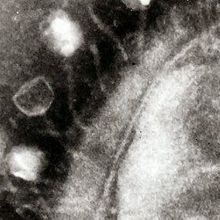Login
Subscribe404
Not Found
Is this what you were looking for?
tag embryogenesis immunology microbiology genetics genomics

Bugs as Drugs to Boost Cancer Therapy
Danielle Gerhard, PhD | Jan 18, 2024 | 7 min read
Bioengineered bacteria sneak past solid tumor defenses to guide CAR T cells’ attacks.
Top 7 in Immunology
Edyta Zielinska | Aug 2, 2011 | 3 min read
A snapshot of the most highly ranked articles in microbiology and related areas, from Faculty of 1000

Eat Yourself to Live: Autophagy’s Role in Health and Disease
Vikramjit Lahiri and Daniel J. Klionsky | Mar 1, 2018 | 10+ min read
New details of the molecular process by which our cells consume themselves point to therapeutic potential.
Bioterrorism Research: New Money, New Anxieties
John Dudley Miller | Apr 6, 2003 | 8 min read
Ned Shaw US scientists have reason to feel both heady and scared. The federal government recently released unprecedented billions of dollars to fund bioterrorism research. Yet, the merits of this sudden shift in focus are being debated, and some worry that the money will be squandered or wasted. "I have been really very upset by the focus on bioterrorism," says Stanley Falkow, professor of microbiology and immunology and of medicine at Stanford University. "Everybody's talking about it, but th

Top 10 Innovations 2013
The Scientist | Dec 1, 2013 | 10+ min read
The Scientist’s annual competition uncovered a bonanza of interesting technologies that made their way onto the market and into labs this year.
Making Things Grow: Insect Cells, Stem Cells, and Primary Cell Lines All Pose Challenges for Cell Culturists
Laura Defrancesco | Jun 21, 1998 | 5 min read
Date: June 22, 1998 Insect Cell Culture Media, Suppliers of Primary Cell Culture Media Advantages for Protein Expression Studies Since the mid-1950s cultures of insects--cockroaches, fruit flies, and leafhoppers, to name a few--have been the object of quiet study by physiologists and cell biologists. But along came genetic engineering and suddenly insect cultures have been put in the spotlight since they provide advantages over both bacterial and mammalian systems for recombinant protein prod

Targeting Antibiotic-Resistant Bacteria with CRISPR and Phages
Anna Azvolinsky | May 18, 2015 | 3 min read
Researchers develop a CRISPR-based, two-phage system that sensitizes resistant bacteria to antibiotics and selectively kills any remaining drug-resistant bugs.
A Look at Drosophila Pattern Formation
Jeffrey Perkel | Sep 2, 2001 | 9 min read
Researchers interested in gene expression studies adopt one of two approaches. They can either examine the expression of a given gene in a population of cells in aggregate, or they can study the gene on a cell-by-cell basis in situ. The advantage of the former approach is its simplicity: It is generally easy to prepare RNA or protein from a given tissue sample and to probe it for the gene or protein of interest. But there are several disadvantages associated with the population approach. First o
60 Members Elected to NAS
Barry Palevitz | Jun 25, 2000 | 6 min read
Editor's Note: On May 2, the National Academy of Sciences announced the election of 60 new members and 15 foreign associates from nine countries in recognition of their distinguished and continuing achievements in original research. Nearly half of the new members are life scientists. In this article, The Scientist presents photographs of some of the new members and comments from a few of them on their careers and on past and current research. A full directory of NAS members can be found online a
Stem Cell Discoveries Stir Debate
Douglas Steinberg | Nov 12, 2000 | 9 min read
Editor's Note: This is the first of two articles on questions raised by recent stem cell discoveries. The second article, focusing on various organs and the nervous system, will appear in the Nov. 27 issue of The Scientist. Researchers first isolated embryonic stem cells (ESCs) from mouse blastocysts almost 20 years ago, and a paper announcing the discovery of human ESCs emerged in 1998. Adult-derived stem cells (ASCs) have since become the rage in certain quarters of biology, with unexpected--